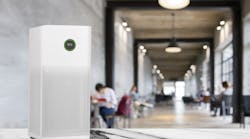Courtesy of Veerapong Boonporn | Dreamstime.com
Voice your opinion!
Voice your opinion!
Indoor air quality (IAQ) has becoming an increasingly important topic for interior designers to consider for their commercial projects, especially in light of health concerns around the pandemic and the relationship between the built environment and human health. In observance of the International Day of Clean Air on Sept. 7, Fellowes Brands, a family-owned company providing workplace solutions for 105 years, recently announced results from a recent national survey that found only 36% of respondents describe the indoor air at their workplace as very clean.
The survey of 1,120 American workers who work on-site and indoors for their employer also revealed that 91% of respondents agree clean indoor air helps them perform their best at work, while 88% believe clean indoor air should be a right for all employees.
The Environmental Protection Agency reports that Americans, on average, spend approximately 90% of their time indoors, where the concentrations of some pollutants are often two-to-five times higher than typical outdoor concentrations, making cleaner indoor air an important focus for businesses on International Day of Clean Air.
COVID-19 and its variants remain top of mind for American workers, with 73% of respondents saying they were at least somewhat concerned about contracting the virus as a consequence of poor IAQ at work.
The majority of survey respondents also reported being at least somewhat concerned about the following additional consequences of poor IAQ in the workplace:
“The results of our survey are clear—most American workers understand the health risks of poor IAQ and the benefits of working in very clean air,” said John Fellowes, fourth-generation CEO of Fellowes Brands. “Businesses that invest in improving their IAQ with air purification, HVAC improvements and increased ventilation will reap rewards with a healthier, happier and more productive workforce at a time of great competition for the best talent.”
Air purification is one of the four key components of cleaner indoor air, according to a recent Lancet COVID-19 Commission report, and it is one of the most effective and fastest-to-install defenses against COVID-19 and other viruses that can quickly spread through workplaces.
Indoor air purification with H13 True HEPA filters can remove 99.95% of particles as small as 0.1 microns, including allergens, such as pollen, dust, pet dander, and smoke that can lead to poor IAQ and associated health risks. Improved IAQ also lowers risk of stroke, lung cancer, respiratory disease, and other health concerns.
